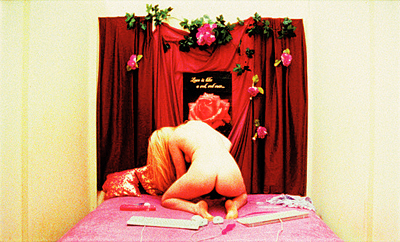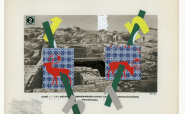| Umělec 2009/2 >> IMPORT EXPORT Ulrich Seidl | Просмотр всех номеров | ||||||||||||
|
|||||||||||||
IMPORT EXPORT Ulrich SeidlUmělec 2009/201.02.2009 Magdaléna Bažantová | art market | en cs de |
|||||||||||||
|
In Ukraine, water does not flow, and colors—if there ever were any—have long faded away. People do not take their hats off when they are inside, they do not greet each other, and they are often ill. Austria cares a great deal about neatness. Perhaps it’s thanks to the abundance of corpses? Dead stuffing, dead relationships, population growing old. People are closer to buffers than to housekeepers, who are left dragging one another back and forth absurdly among each other. You will not keep your head above water if you are not dead serious about embalming.
Some miles further west, there is not much mood for fun either. Your education and personality are useless if there is no one to pay you for it. However, one will pay you for being a woman under thirty with dyed hair and a decent figure. If this does not help either, you can also give up on family relationships, children, home, and your mother tongue and go to the west. Not that anyone would notice your absence. On the contrary, they feel endangered by an unknown force. Basically, it is your willingness to be nobody that they find unconceivable and suspicious. How bright is it over here in Austria? How can we exist in a civilization of sterility? Shout and let others shout at us within the bodyguard training even if we know that afterwards we are just checking the door and are filling out the forms with the option that nothing even happened? We get tattoos, drink, and talk about women. Then, when it comes to being close to them, we are unable to do anything else but just show them our unfounded power. It’s no wonder that Austrian women wreak vengeance upon people with even lower social status. „I may hire or fire you. That‘s the way the cookie crumbles.“ Emptiness of the wife who does not pardon any hint of virility—physical and energetic—is being filled out by further feelings of power and superiority. Suppressed envy results in economic sanctions or open violence. The nurse makes seniors childish and tortures them bit by bit—similarly to social systems, which undermine adulthood and offer toys and supervision in reward for obedience. Seidl, however, is on the side of the tragedy-generating Ukrainian society, rather than on the side of the Austrian one. All this, in his interpretation, grows into useless awkwardness. Everything drowns in the awkwardness—partner relationships of long standing, employment, social systems, personal dreams of muscles and prosperity, desperate efforts to experience fun. At a terrifying ball in a hospice, a song resounds and the lyrics go: “Happy is the man who forgets about things that cannot be changed...” On the other hand, the Ukrainian line goes: “My heart...” I like the trend of using exclusively diegetic music. Morbid mutterings of old people turns out to become a musical hospital for the spirit. I appreciate the strict chronological pacing of the movie. The cameraman does not use over-impressive shots; we only sometimes realize the tastefulness of the scene, like when the cleaners are standing upright in a half circle, father and son are sitting in the middle of a standardized living room, and so on. Casting of non-actors works properly in this movie. The authentically dull expressions of girls in a Ukrainian hotel, the convincing senility of the elderly patients, the Romanian children fighting for chewing gums. The episode with Slovak Romanians does not fit too much in the content. For the observer, it is a merely interesting place and one might say that the principle that everything can be bought for money is illustrated at its fullest. Pauli had of course known this before. This environment, however, is intractable even for the rough ones with guarding training—not even money will make you master of the situation. On the contrary, if there is anything that can be taken, it will be taken away from you. Again, he goes through powerlessness, the same feeling he was exposed to at the supermarket parking lot where even his muscles were not enough to prevent him from the superior numbers of the youngsters. The only solution is to run away. For one who is a loser most of the time, there is no other option but defeat. One of the symptoms of being a loser is the inability to evaluate the situation. On the other hand, the child who runs away from his lecherous step-father seems to be victorious in a way. But who is the winner? If it is “the man who forgets about things that cannot be changed” the winner is the head nurse and Pauli’s parents. But no one imagines a winner like that, and that would be the reason why so many critics could not get along with this movie. With whom could they identify themselves? In connection with this movie, some authors used words like cruelty, pornography, and abuse. I think the point was that there were no characters that seem morally indisputable. A character that knows, a character that is not just the creature of circumstance... It is just the “me”, which is missing. Yet Seidl is latently sympathetic with his heroes, so why not accept that we are a bit of Olga, a bit of Pauli, a bit of the jealous nurse, the unhinged step-father, a bit of a mother limited to buying blouses from delivery catalogues...and that one day we will be, in the best case, wearing diapers and muttering in bed. Shouting that Seidl is a voyeur and that it is impolite to illustrate contemporary society in this way is ridiculous. I would invite the agitated to stand outside in the street after the opening party of one of the festivals—perhaps they will observe a charming assemblage of citizens shining with humanism. After watching the movie, I was relieved to find that Olga and Pauli did not meet. I would also like to write something provocative about the movie. It is easier to read about these things, however; then you do not look like a blind admirer who, after coming home from the cinema, read columns in cultural sections and spurts out another paean to the author. In the case of the movie IMPORT/EXPORT, however, I will leave it at that.
01.02.2009
Рекомендуемые статьи
|
|||||||||||||








Комментарии
Статья не была прокомментированаДобавить новый комментарий